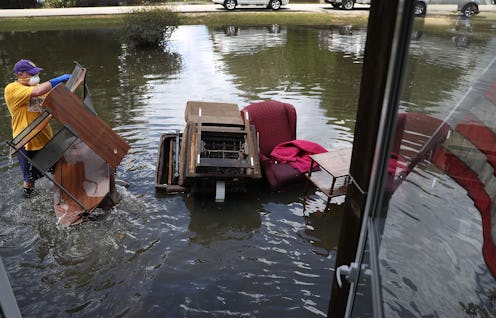News
Hurricane Katrina Victims Help Restore Baton Rouge
It's been 11 years since Hurricane Katrina ravaged homes and lives across New Orleans and the surrounding region, and communities within and outside have since rallied together to rebuild the areas affected. But the devastating floods in Baton Rouge, Louisiana last month have inspired a strong sense of deja vu for many in New Orleans. Ever since the recent floods which struck the area, Hurricane Katrina victims are helping those in Baton Rouge through the hands of volunteers and a push for fundraising efforts. It's an inspirational act founded on common struggle and pain.
The floods in Louisiana destroyed at least 60,000 homes, and around 80 percent of the houses affected did not have flood insurance, according to a Wall Street Journal which spoke to several aid organizations. New Orleans resident Connie Uddo, the head of local nonprofit Nola Tree Project, sent 200 volunteers to Baton Rouge on Aug. 27 to help in the aftermath of the floods. "The people of New Orleans, they really see how important it is to pay it back and pay it forward, because it was the volunteers who clearly rebuilt our city after Katrina," Uddo told The Wall Street Journal. After her house flooded in 2005 due to Hurricane Katrina, Uddo turned her efforts into community organizing, and she is now focusing her attention on Baton Rouge. "That's neighbors helping neighbors," she told the paper.
Another New Orleans native is throwing his hand in to help out those affected by the new floods. NPR's Ari Shapiro spoke to Errol Joseph, whose house flooded in the Katrina aftermath in 2005 and who is now helping Lowernine.org by working with volunteers to help rebuild areas affected by the devastation in Baton Rouge. In Shapiro's introduction, he spoke about the work of Lowernine.org — a group of volunteers who have helping flooded homes over the last eleven years, focusing mostly on the Lower Ninth Ward in New Orleans, but are now turning their attention toward others affected by a similar environmental disaster.
As you can imagine, for volunteers like Joseph and Uddo, seeing and working in Louisiana after experiencing Katrina must bring back some memories of struggle and hardship. When Shapiro asked Joseph about it, his response perfectly captured this sense of unity and deja vu: "...as I traveled down Precott, there's a church around here, and I could see all of the new furniture and everything out. And I said, man, this is the same old deja vu."
There seems to be a kind of bittersweet understanding and sense of responsibility between the two states. Apparently, more than half of volunteers for All Hands Volunteer, an international nonprofit that is helping homes in east of Baton Rouge, are from Katrina-affected areas, the organization's director of U.S. disasters, Sherry Buresh, told The Wall Street Journal.
But help isn't coming solely in the form of volunteers, as New Orleans residents are also putting their efforts into some big fundraising. The Greater New Orleans Foundation has raised over $112,000, with 60 percent of that money coming from the pockets of local residents, as Carmen James, the vice president of programs, said to The Wall Street Journal.
Some are double victims of both Hurricane Katrina and the new Baton Rouge floods, and for them, the process of rebuilding their lives has been a devastating experience. On the 11th anniversary of Katrina, it's important to recognize the efforts of local and national communities and nonprofits that once pushed through that storm, and are now plunging into the aftermath of the Louisiana floods.
